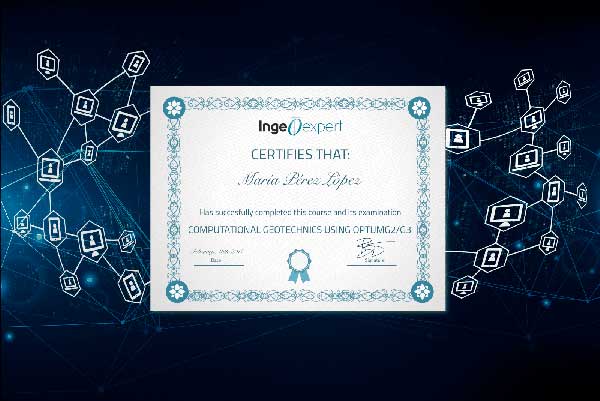Finite element analysis using Abaqus software
Online course |
|
50 hours / 6 weeks |
|
|
Dates: 2nd of September to 14th of October |
| Standard | Unemployed Or Student |
| $637 | $313 |
Introduction
Finite Element (FE) method is widely used by industry-leading companies, like NASA, Boing, Apple, Alphabet, Microsoft, Caterpillar, BMW, Volvo among others, to perform many types of analysis including structural simulations. Abaqus FEA (Dassault Systèmes Simulia Corp.) is the world’s technology-leading software that is mostly used for structural finite element simulations and results-postprocessing. The software includes a rich library of material models that enables simulating many structures made from different materials like metals, polymers, biomaterials, composites, etc. Abaqus FEA software includes geometric, material, and contact nonlinearities and has two main solvers for structural simulations:
- Abaqus/Standard: A Finite-Element analysis solver based on implicit integration scheme, which can be used to perform linear and nonlinear static, quasi-static, and dynamic FE analysis.
- Abaqus/Explicit: A Finite-Element analysis solver based on explicit integration scheme, which can be used to solve highly nonlinear systems. It is mainly used for dynamic simulations. However, it can be used to perform quasi-static finite element analysis as well.
Objectives
By the end of this course, you will have the needed background, knowledge, and practical experience to use Abaqus standard and explicit solvers to perform various types of analysis with confidence. Besides by the end of this course, you will learn how to professionally post-process analysis results using Abaqus viewer.
Limited places.
Abaqus Student Edition free license can be obtained from this link.
This course consists of six different sessions (1 session/week). In this course you will be provided a theoretical background review about the following topics:
- – Introduction to solid mechanics.
- – Linear finite element method.
- – Nonlinear finite element method.
- – Extended/generalized finite element method.
- – Material fracture and failure.
Besides, you will be given detailed training about the Abaqus software. In particular, in this course the following topics will be covered:
- – Introduction to the analysis capabilities of Abaqus.
- – Building and editing an Abaqus analysis file (*.inp file).
- – Element Selection.
- – Modeling Contact and Resolving Convergence Issues.
- – Modeling Rubber and Viscoelasticity.
- – When and how to use Abaqus Explicit solver.
- – Modeling Fracture and Failure.
- – How to use Abaqus viewer to post-process analysis results.
Ashraf Idkaidek
Dr. Idkaidek is currently holding an engineering project team leading position at the Innovative Technology and Development Division, Caterpillar Inc., USA. In addition, he is actively working as a researcher at the University of Illinois at Urbana Champaign, USA.
Dr. Idkaidek has a Ph.D. degree in Mechanical engineering from the University of Illinois at Urbana Champaign (one of the top 10 engineering universities in the USA), a master’s degree in Structural Engineering, and a bachelor’s degree in Civil Engineering.
Dr. Idkaidek has rich engineering experience, where he has over 14 years of practical engineering experience leading a team of engineers performing linear, nonlinear, static, and dynamic numerical simulations mainly using the finite element method. Besides, he has extended academic research experience in bioengineering area, where he published five journal papers in the past few years in this topic.
All of our courses are offered 100% online, through our intuitive Virtual Campus. Topics are taught through:
- – Videos
- – Interactive multimedia content
- – Live classes
- – Texts
- – Case studies
- – Evaluation exercises
- – Additional documentation
The content is updated in each new course edition, so that knowledge is acquired around the latest news and state-of-the-art geotechnical engineering technology.
One of the most interesting aspects of our courses is the use of live videoconferences, in which teachers and students interact in a continuous exchange of knowledge and problem solving. In addition to this, students can make use of the platform’s forum, a meeting point where they can interact with teachers and other students.
A tutoring system will also be established by email, which will resolve any possible doubts about the course, and which will serve as a point of connection for students with specific questions on each module.
Students can also download all course documentation, including texts, videos, video conferences and exercises.
This course is intended, but not limited to:
- – Senior undergraduate Civil, Structural, Mechanical, Aerospace and Industrial engineering students.
- – Graduate Civil, Structural, Mechanical, Aerospace and Industrial engineering students.
Knowledge about the finite element analysis method is needed. However, a brief review of the finite element method will be provided at the early stage of this course.
The student needs to have an Abaqus software license to be able to run simulation and view results.
At the end of the course, and as accreditation of knowledge acquired and of the technical and practical training, students who correctly complete the corresponding evaluation tests of the geotechnical engineering course will obtain an academic certificate issued by Ingeoexpert. This digital certificate is protected by Blockchain technology, making it unique and tamper-proof, thus enabling companies to verify its authenticity.
It can also be downloaded by students, forwarded by email and shared on social networks, as well as embedded on any website. You can see an example here.
If you are interested in joining the advanced structural finite element simulation world to be able to evaluate the structural integrity for complicated geometries (like bridges, high-rise buildings, cars, airplanes …etc.) Then this course is for you. The market is currently in high demand for highly skilled engineers that know how to use Abaqus FEA software professionally. Leading companies are willing to pay high/competitive salaries for such skilled engineers.
Introduction
Finite Element (FE) method is widely used by industry-leading companies, like NASA, Boing, Apple, Alphabet, Microsoft, Caterpillar, BMW, Volvo among others, to perform many types of analysis including structural simulations. Abaqus FEA (Dassault Systèmes Simulia Corp.) is the world’s technology-leading software that is mostly used for structural finite element simulations and results-postprocessing. The software includes a rich library of material models that enables simulating many structures made from different materials like metals, polymers, biomaterials, composites, etc. Abaqus FEA software includes geometric, material, and contact nonlinearities and has two main solvers for structural simulations:
- Abaqus/Standard: A Finite-Element analysis solver based on implicit integration scheme, which can be used to perform linear and nonlinear static, quasi-static, and dynamic FE analysis.
- Abaqus/Explicit: A Finite-Element analysis solver based on explicit integration scheme, which can be used to solve highly nonlinear systems. It is mainly used for dynamic simulations. However, it can be used to perform quasi-static finite element analysis as well.
Objectives
By the end of this course, you will have the needed background, knowledge, and practical experience to use Abaqus standard and explicit solvers to perform various types of analysis with confidence. Besides by the end of this course, you will learn how to professionally post-process analysis results using Abaqus viewer.
Limited places.
Abaqus Student Edition free license can be obtained from this link.
This course consists of six different sessions (1 session/week). In this course you will be provided a theoretical background review about the following topics:
- – Introduction to solid mechanics.
- – Linear finite element method.
- – Nonlinear finite element method.
- – Extended/generalized finite element method.
- – Material fracture and failure.
Besides, you will be given detailed training about the Abaqus software. In particular, in this course the following topics will be covered:
- – Introduction to the analysis capabilities of Abaqus.
- – Building and editing an Abaqus analysis file (*.inp file).
- – Element Selection.
- – Modeling Contact and Resolving Convergence Issues.
- – Modeling Rubber and Viscoelasticity.
- – When and how to use Abaqus Explicit solver.
- – Modeling Fracture and Failure.
- – How to use Abaqus viewer to post-process analysis results.
Ashraf Idkaidek
Dr. Idkaidek is currently holding an engineering project team leading position at the Innovative Technology and Development Division, Caterpillar Inc., USA. In addition, he is actively working as a researcher at the University of Illinois at Urbana Champaign, USA.
Dr. Idkaidek has a Ph.D. degree in Mechanical engineering from the University of Illinois at Urbana Champaign (one of the top 10 engineering universities in the USA), a master’s degree in Structural Engineering, and a bachelor’s degree in Civil Engineering.
Dr. Idkaidek has rich engineering experience, where he has over 14 years of practical engineering experience leading a team of engineers performing linear, nonlinear, static, and dynamic numerical simulations mainly using the finite element method. Besides, he has extended academic research experience in bioengineering area, where he published five journal papers in the past few years in this topic.
All of our courses are offered 100% online, through our intuitive Virtual Campus. Topics are taught through:
- – Videos
- – Interactive multimedia content
- – Live classes
- – Texts
- – Case studies
- – Evaluation exercises
- – Additional documentation
The content is updated in each new course edition, so that knowledge is acquired around the latest news and state-of-the-art geotechnical engineering technology.
One of the most interesting aspects of our courses is the use of live videoconferences, in which teachers and students interact in a continuous exchange of knowledge and problem solving. In addition to this, students can make use of the platform’s forum, a meeting point where they can interact with teachers and other students.
A tutoring system will also be established by email, which will resolve any possible doubts about the course, and which will serve as a point of connection for students with specific questions on each module.
Students can also download all course documentation, including texts, videos, video conferences and exercises.
This course is intended, but not limited to:
- – Senior undergraduate Civil, Structural, Mechanical, Aerospace and Industrial engineering students.
- – Graduate Civil, Structural, Mechanical, Aerospace and Industrial engineering students.
Knowledge about the finite element analysis method is needed. However, a brief review of the finite element method will be provided at the early stage of this course.
The student needs to have an Abaqus software license to be able to run simulation and view results.
At the end of the course, and as accreditation of knowledge acquired and of the technical and practical training, students who correctly complete the corresponding evaluation tests of the geotechnical engineering course will obtain an academic certificate issued by Ingeoexpert. This digital certificate is protected by Blockchain technology, making it unique and tamper-proof, thus enabling companies to verify its authenticity.
It can also be downloaded by students, forwarded by email and shared on social networks, as well as embedded on any website. You can see an example here.
If you are interested in joining the advanced structural finite element simulation world to be able to evaluate the structural integrity for complicated geometries (like bridges, high-rise buildings, cars, airplanes …etc.) Then this course is for you. The market is currently in high demand for highly skilled engineers that know how to use Abaqus FEA software professionally. Leading companies are willing to pay high/competitive salaries for such skilled engineers.
3 reviews for Finite element analysis using Abaqus software
More info
Finish this course and get a certificate based on Blockchain
Finite element analysis using Abaqus software

Blockchain technology makes the certificate incorruptible, enabling companies to verifiy its autenticity.
Finite element analysis using Abaqus software
| $637 | $313 | |
| Get more information |




Hugo Huaringa Aurelio –
MUY BUENO EL CURSO DE ABAQUS, Y SU FORMA DEL DICTADO Y TODO SU ESTRUCTURA ORGANIZACION.
Gaby Ngoie –
Wonderful platform and modern organization for education, Good teaching quality from professors.
ARTON DAUTAJ –
The course was really valuable and informative. Professor Idkaidek is very kind, communicative and he is reachable and available any time. I will recommend this course to any civil engineer and researcher